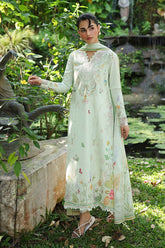The Allure of Bridal Dresses in Pakistan: A Touch of Japan Textiles
Fashion of the brides in Pakistan is an outstanding combination of culture and modern trends in industry. Since weddings occupy an important place in the traditions of Pakistan, the bridal dress is considered the main element of the celebration. This year has posed certain challenges in the bridal fashion scene, getting new materials such as fabrics and new techniques of designing to integrate Japan textiles into bridal fashion. This particular article aims to present the topic of bridal dresses in Pakistan whose modern silhouettes owe much to Japanese textiles.
The Role of Bridal Wears in The Pakistani Culture

As is known, weddings in Pakistan are rather lavish and consist of the numerous pre and post wedding rituals. The bridal dress has power within this celebration as it represents the bride’s movement into a novel period of life. Originally a bridal gown has a rich style parallel with decoration and shining colours, it is recognized as clothing that accented the bride's character and family tradition.
When it comes to bridal dresses, they come in all types of material and style such as the lehenga choli, modern gown and fusion wear. The type of dress is controlled by the cultural pull, the kinship consideration and the generally current fashion of dressing, where every dress worn by the bride narrates a story.
A Brief History of Bridal Wear
Traditional bridal wear of Pakistan was once heavy in sewing. However, the modern bride requires flexibility and comfort excluding stylish appearance. The changing customer preferences explained herein have therefore been instrumental in the development of light fabrics and great designs that are designed to represent bridal wear traditionally without compromising on modernity.
Now it became possible to play with silhouettes, colours and fabrics to add some modern elements making breathless bridal gowns. This trend has been boosted by fashion weeks and bridal expos to provide manufacturers a platform to exhibit their innovation.
This is the Influence of Japan textiles. Unlike textiles from many other countries, Japan textiles boast of high quality, quality workmanship and astounding designs. These fabrics are thus valued greatly in the fashion industry due to extreme details that are accompanied by the use of new weaving and dyeing technology. Currently, Pakistani designers have appreciated the Japan textiles and have adopted them in their bridal wear to give them a quality look.
Distinct features of Japan Textiles
High Quality: The textiles produced in Japan are famous throughout the world for its fine quality, agility and splendid touch. There are different touch sizes and finishes of fabrics that are used in bridal wear such as silk, satin and brocade among others.
Innovative Designs: Japanese fabrics tend to have detailed and specific designs and are coloured differently, and so visual and aesthetic bridal dresses can be created.
Sustainability: While bridal wear is still a popular category in Japan, many textile makers in the country adopt sustainable approaches to their work by providing fabrics, which are environmentally friendly and sourced responsibly.
Lightweight and Comfortable: Japan textiles are generally lighter than conventional bridal fashions where brides get the comfort they need without necessarily compromising on the fabric's beauty.
Well Known Fashion Designers
Some of the Pakistani have used Japan textiles in bridal collections, which has taken their designing level and setting trends. Here are a few notable designers who have integrated these exquisite fabrics into their bridal wear:
-
Sana Safinaz
Sana Safinaz is one of the most famous fashion houses in Pakistan especially famous for bridal wear. This brand presumably always employs Japan textiles, their colours and textures are applied to create beautiful bridal wear. More importantly, the styles they offer come in rather elegant designs reflecting traditional workmanship coupled with modernity pleasing to contemporary brides.
-
Ali Xeeshan
Famous for his theatre costumes, Ali Xeeshan, often incorporates Japan textiles into his incredibly dramatic bridal wear. He’s popular for using bold colours, some forms of embroidery, and coming up with rather unique styles. Xeeshan, for instance, makes sure his bridal dresses are luxurious, comfortable, and stylish because he uses High-quality Japanese fabrics.
-
Elan
Elan is the pride of bridal fashion related to elegance and sophistication in bridal gowns. The brand is well aware of details and sometimes harmoniously combines Japan textiles into beautiful bridal lines. The attire has exquisite embroidery work, bright, beautiful colours as well as rich fabrics; it enjoys a lot of demand among bride-to-be’s who would like to be different.
-
Huma Adnan
The bridal collection of Huma Adnan is a good example of modern wear with most of them illustrating the incorporation of Japan fabrics. As a designer, Adnan is well acclaimed for her exquisite creations, hence she combines elegant timeless bridal styles with modern trends so that most brides would identify with.
The Process of Designing Bridal Wear
Bridal dress making process followed in Pakistan can pass through several phases ranging from designing to trying on stage. Here’s a closer look at the process:
-
Inspiration and Concept
Fashion designers may get their ideas from culture, art or whatever fashion trends that are in vogue at that time. Japan textiles can be incorporated and can alter the first idea as designers consider how those fabrics will complement their concepts.
-
Fabric Selection
After the concept is defined then the designers decide on the type of fabric that is to be used. The incorporation of Japan textiles into the bridal wear gives it that special touch and quality of sophistication. The choice of colours and patterns of fabrics and auspices is very important as their combination should correspond to the general concept of the wedding.
-
Design and Embellishment
Following materials choice, styles and designs are drawn out and patterns are made and bag details including trims, logos, embroidery, embellishments and cut designs are developed. Traditional hand embroidery works including zardozi and gota are usually blended with other modern features in order to bring out fantastic ornamental visions.
-
Fitting and Adjustments
The last process involves trials with the bride to confirm that all fits properly into place. This stage is important because bridal dresses should be comfortable and, at the same time, they must look absolutely fabulous. There are usually modifications made in order to make the dress capture the bride's personality and taste.
Trends in Bridal Fashion

With the integration of Japan textiles, several trends have emerged in bridal fashion in Pakistan:
-
Sustainable Choices
Thanks to increased public awareness about sustainable fashion, many bridal wear designers have embraced green fashion production. Benefitting the brides, Japan textiles of sustainable clothing characteristics perfectly fitted this trend.
-
Fusion Styles
Many brides of today prefer to go for fusion dressing styles that contain traditional dressing styles combined with modern dressing styles. That is why designers are using this trend to introduce a new aspect of Japan textiles integrated into timeless shapes, which creates new bridal wear.
-
Minimalist Designs
As for bridal wear, the latter is usually complex and is now as an increasing number of women are in search of simple dresses. Applying high-quality fabrics from Japan, designers are able to produce modest yet sophisticated designs which are appareled today.
Conclusion
Modern Pakistani bridal fashion continues to grow and change, this new and exciting addition of Japan textiles adds a whole new level of exquisiteness to the mix. This is seeing designers incorporate these cashmere like fabrics into making enhanced bridal wears which are stained with both past and present endowments. Since many brides aim at something novelty, exclusive and luxurious on their big day, the trends set by Japanese textiles should not be far from having an impact on the future of bridal fashion in Pakistan.
It will be seen that Pakistani designers are all set to provide bridal wear to suit the modern women owing to rich cultural history, artisanal skills, and today’s trends. Regardless of deciding on the classic lehenga or on the elegant gown, the use of Japan fabrics turns each dress into a masterpiece, and therefore the bride’s day is even more unique.







